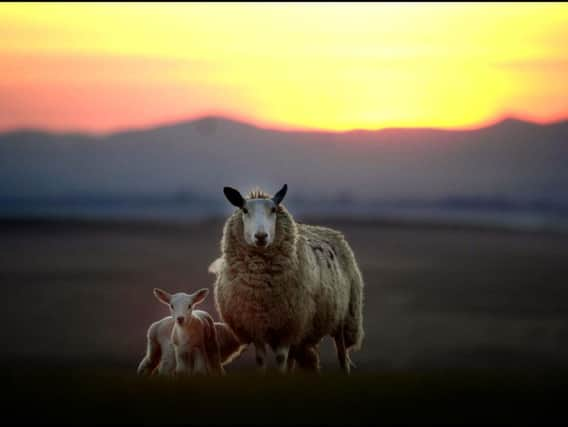Why climate change means big change for Scotland's farmers – Dr Sheila George


This is going to be a big year for Scotland. The eyes of the world will be on us in coming months as we prepare to host an important conference on nature in April, while near the end of the year, a crucial global climate conference will be held in Glasgow.
Scotland was the first nation in the world to declare a climate emergency, followed by ambitious targets to reduce greenhouse gas emissions by 75 per cent by 2030 and reach net-zero emissions by 2045. With that legacy comes responsibility and last month the UK Committee on Climate Change (CCC) warned that the Scottish Government had to "walk the talk" if the country is to meet the 2045 net-zero target, singling out transport and farming as two areas in need of more attention.
Advertisement
Hide AdAdvertisement
Hide AdFarming and land-use change for food production create almost a quarter of greenhouse emissions in Scotland, including 68 per cent of methane and 79 per cent nitrous oxide emissions. Despite an initial reduction from 1990s levels along with improvements in efficiency and technological advances, these emissions have not fallen significantly over the last decade and have been almost static for the last five years.
Farmers, as managers of a significant area of Scotland’s land, have a vital role in capturing carbon from the atmosphere, creating carbon stores in the soil and vegetation. Meeting the net-zero target will require both a reduction in emissions and an increase in these carbon stores, which the CCC warns will require urgent policy change. They argue that this must include a move away from the voluntary approach, which has failed to secure the necessary progress over the last ten years.
Agro-forestry and organic farming
There’s no doubt this will be challenging, but the good news is that it is achievable. A recent report, commissioned by WWF Scotland, highlighted that our agriculture sector can comfortably reduce its greenhouse emissions by 38 per cent by 2045 and could go beyond this on an individual farm level with little or no land-use change.
A range of measures includes reducing nitrous oxide emissions from crop production, such as by more efficient use of nitrogen fertiliser through precision application, rotational grazing and using nitrogen-fixing crops. Methane emissions from livestock can also be reduced by making improvements to animal health and breeding, for example by improving growth rates or feed-conversion rates, and by introducing feed additives.
The independent report also sets out system-level changes which could deliver significant carbon savings, including a shift to organic production, agro-forestry (integrating trees in farms) and conservation agriculture (with a focus on soil health and plant diversity). The measures are feasible, well-evidenced, use established technologies and can be implemented singly or in combination.
The report echoes the call from the CCC for an urgent review of the policy and support framework to help farmers adopt activities which reduce emissions and maximise the carbon removed from the atmosphere and locked up in our soils and plants.
UK sets long-term direction of travel
The forthcoming Scottish Budget, due in early February, will be the next big test of whether the Scottish Government is serious about putting the fight against climate change at the heart of its work. We’re calling for the Budget to introduce funding to help farmers assess farm-level emissions and to adopt measures which will help them make reductions. This will require dedicated advice and training. We also want more funding for tree planting and peatland restoration, which help capture and store more carbon.
We all know policy change can take time, but there are several things we can do right now to meet the climate challenge. The Climate Change Act, passed late last year, introduced new requirements, such as the development of whole farm climate plans and introduction of a nitrogen balance sheet to calculate nitrogen-use efficiency, as well as an agriculture transformation program to help agriculture respond to climate change.
Advertisement
Hide AdAdvertisement
Hide AdThe UK Government has just set out how it will govern farming in England after leaving the EU. Its Agriculture Bill sets the long-term direction of travel including proposals to reward farmers financially for measures such as protecting land, water and air, while supporting plants and wildlife.
It also wants farmers to help tackle climate change, maintain beautiful landscapes, improve public access and boost animal health and welfare. Here an interim Scotland Agriculture Bill, currently before the Scottish Parliament, only covers the next four years.
It has the potential to create the funds and framework required in the immediate term to set a new direction towards climate-friendly farming, and give support to help farmers make the transition, but as it currently stands, those opportunities could be missed.
A critical decade
The revised Scottish Climate Plan, due in the spring, will identify new targets for emissions reduction from agriculture and set out how we can get there. The CCC is also expected to publish its latest report, Land Use: Policies for a Net Zero UK, later this week, which will outline the policies needed to secure emissions reductions and remove more carbon through land use.
The next ten years will be critical if we’re to meet our climate targets and avoid the worst predicted impacts of climate change. We don’t have all the solutions yet, but what is clear is that all sectors will have to play their part in reducing our emissions.
We know enough to take action now, seizing the opportunities available to limit temperature rises. It’s possible for Scotland to end its contribution to climate change within a generation.
In doing this we can create a healthier, fairer and more prosperous Scotland for us all.
Dr Sheila George is food and environment policy manager at WWF Scotland